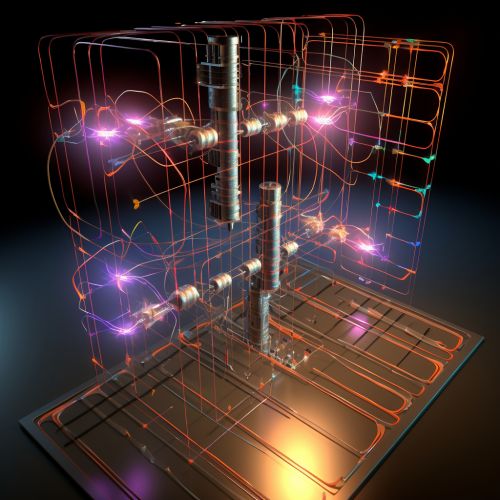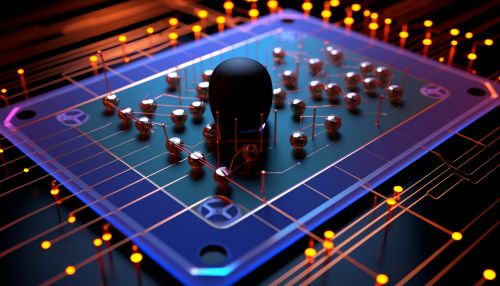Advances in Quantum Computing with Quantum Logic Gates
Introduction
Quantum computing is a rapidly advancing field of study that leverages the principles of quantum mechanics to perform computational tasks. One of the key components of quantum computing are quantum logic gates, which are the building blocks of quantum circuits and algorithms. Quantum logic gates operate on quantum bits, or qubits, which unlike classical bits, can exist in a superposition of states, thus enabling the potential for massive parallelism in computation.
Quantum Logic Gates
Quantum logic gates are the fundamental units of quantum computation. They are specific types of quantum operations that can be performed on qubits. Unlike classical logic gates, which operate on binary data (0s and 1s), quantum logic gates operate on qubits, which can exist in a superposition of states. This allows quantum logic gates to perform complex computations in a single step, a feature that is not possible with classical logic gates.


The most common quantum logic gates are the Pauli-X, Pauli-Y, Pauli-Z, Hadamard, phase, π/8, controlled-NOT (CNOT), and the swap gate. Each of these gates performs a specific operation on one or more qubits, and they can be combined to form quantum circuits that perform complex computations.
Pauli Gates
The Pauli gates, named after the physicist Wolfgang Pauli, are a set of three quantum logic gates that perform specific operations on a single qubit. The Pauli-X gate is the quantum equivalent of the classical NOT gate. It flips the state of a qubit from |0⟩ to |1⟩ and vice versa. The Pauli-Y and Pauli-Z gates perform more complex operations that involve changing the phase of the qubit.
Hadamard Gate
The Hadamard gate is a single-qubit gate that puts a qubit into a superposition of states. This is a key operation in many quantum algorithms, as it allows for the parallel execution of computations.
Phase and π/8 Gates
The phase and π/8 gates are single-qubit gates that perform phase shifts on the states of a qubit. These gates are used in many quantum algorithms to manipulate the probabilities of measuring different states.
Controlled-NOT Gate
The controlled-NOT (CNOT) gate is a two-qubit gate that performs a NOT operation on the second qubit if the state of the first qubit is |1⟩. This gate is essential for creating quantum entanglement, a key resource in quantum computation.
Swap Gate
The swap gate is a two-qubit gate that swaps the states of two qubits. This gate is useful in quantum algorithms that require the manipulation of multiple qubits.
Quantum Circuits and Algorithms
Quantum circuits are sequences of quantum gates that perform a specific computation. They are the quantum equivalent of classical circuits, but with the added complexity of superposition and entanglement.
Quantum algorithms are computational procedures that use quantum circuits to solve problems. Some of the most well-known quantum algorithms include Shor's algorithm for factorizing large numbers, Grover's algorithm for searching unsorted databases, and the quantum Fourier transform.
Advances in Quantum Computing with Quantum Logic Gates
The field of quantum computing has seen significant advances in recent years, many of which are directly related to improvements in quantum logic gates.
Improved Gate Fidelity
One of the key challenges in quantum computing is maintaining the coherence of qubits during computation. Quantum logic gates must be able to perform operations on qubits without causing decoherence, a process that leads to the loss of quantum information. Recent advances have led to significant improvements in gate fidelity, which is a measure of the accuracy of a quantum gate operation.
Scalability of Quantum Systems
Another important advancement is the increased scalability of quantum systems. Quantum computers require a large number of qubits to perform complex computations, and the ability to scale up quantum systems is crucial for the practical implementation of quantum computing. Advances in quantum logic gates have contributed to the development of larger and more reliable quantum systems.
Development of Quantum Error Correction Codes
Quantum error correction codes are techniques used to protect quantum information from errors due to decoherence and other quantum noise. The development of efficient quantum error correction codes is a major advancement in quantum computing, as it allows for more reliable computation with quantum logic gates.
Conclusion
Quantum computing, with its potential to solve problems that are intractable for classical computers, is a rapidly advancing field. Quantum logic gates, as the fundamental units of quantum computation, play a crucial role in this advancement. With ongoing improvements in gate fidelity, scalability of quantum systems, and the development of quantum error correction codes, the future of quantum computing looks promising.
